 Petzlover
Petzlover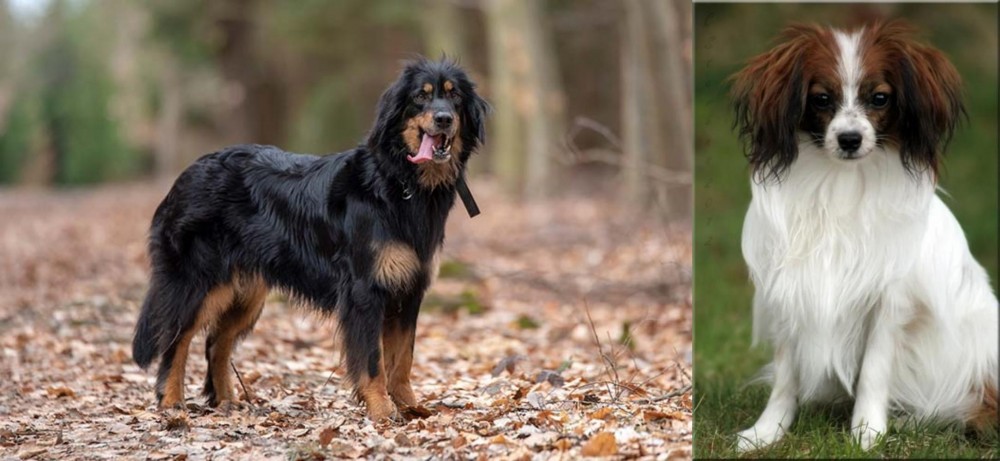 Hovawart is originated from Germany but Phalene is originated from France. Hovawart may grow 42 cm / 17 inches higher than Phalene. Hovawart may weigh 46 kg / 102 pounds more than Phalene. Both Hovawart and Phalene has almost same life span. Hovawart may have more litter size than Phalene. Hovawart requires Low Maintenance. But Phalene requires Moderate Maintenance
Hovawart is originated from Germany but Phalene is originated from France. Hovawart may grow 42 cm / 17 inches higher than Phalene. Hovawart may weigh 46 kg / 102 pounds more than Phalene. Both Hovawart and Phalene has almost same life span. Hovawart may have more litter size than Phalene. Hovawart requires Low Maintenance. But Phalene requires Moderate Maintenance
 The Hovawart, is a German Black Forest breed developed as a guard dog for large estates in the medieval era. They first appeared in history in the early 13th century as heroes who saved the German son of a castle lord, despite being injured themselves. The boy they saved grew up to be a German legend. He wrote the oldest German code of law that remained from medieval times. In it he names the Hovawarts as a dog that if you are responsible for hurting, stealing or killing it, you must pay for it or replace it. No other dog had this protection.
The Hovawart, is a German Black Forest breed developed as a guard dog for large estates in the medieval era. They first appeared in history in the early 13th century as heroes who saved the German son of a castle lord, despite being injured themselves. The boy they saved grew up to be a German legend. He wrote the oldest German code of law that remained from medieval times. In it he names the Hovawarts as a dog that if you are responsible for hurting, stealing or killing it, you must pay for it or replace it. No other dog had this protection.
In the late fifteenth century Hovawarts were featured in Heinrich Mynsinger’s “The Five Noble Breeds”. This guard dog breed was esteemed on a level with the hunting dogs – their health a question of life or death for their owner. In the 1500’s the popularity of the breed began to fade. The GSD or German Shepard Dog began to replace the Hovawarts as the preferred guard dog.
By the early 20th century the breed had almost disappeared but were saved by breed enthusiasts in the early 1900’s. Zoologist Kurt Konig was prominent in this effort and went looking in the Black Forest area for dogs working on farms. Using the dogs, he found on these farms, Konig began a breeding program crossing the them with Newfoundland’s, Kuvazoks, Leonbergers, GSD, an African hunting dogs and Bernese Mountain Dogs.
By 1922 the first litter of these pups was entered officially into the German Breeding Registry. In 1937 the Hovawart was recognized by the German Kennel Club. However, many members of the breed died in World War II as they were used widely by the military and not many were left by 1945. Once again breed enthusiasts came to the rescue forming a Coburg Hovawart club. This club still exists and in 1964, for the second time, the breed was recognized by the German Kennel Club. Other countries also began to take notice of this working breed.
The Hovawart has many skills in addition hunting and guarding. The Hovawart does not work for people, he works with them as he is a very independent thinker. He is also good at search and rescue and tracking. An owner of this breed must be stronger, smarter, more alert, intentional and consistent than his Hovawart. These are not dogs for the faint of heart or first-timers.
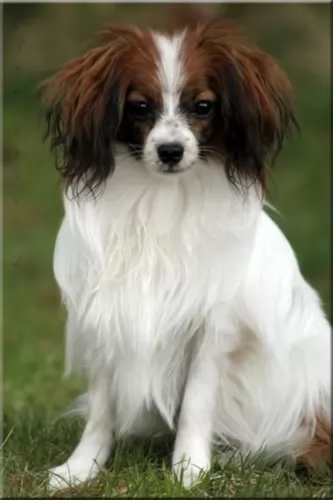 The Phalène is a toy breed, and in fact the Papillon and Phalène differ only by their ears, but are exactly the same in all other ways.
The Phalène is a toy breed, and in fact the Papillon and Phalène differ only by their ears, but are exactly the same in all other ways.
Thought to have developed in Western Europe, its exact origin isn’t clear but it is an ancient breed, as paintings seem to indicate that it has been around since the 16th century.
It is essentially a companion dog today. The dog is classified as a variety of the Papillon by the AKC, with the FCI classifying it as a separate breed.
 The Hovawart is a proud and majestic dog and his looks match his character. He looks a bit like the Golden Retriever with a powerful and broad forehead. His skull and muzzle are the same length and his nose is black. His oval eyes are a medium to dark brown and his ears are high set and triangular.
The Hovawart is a proud and majestic dog and his looks match his character. He looks a bit like the Golden Retriever with a powerful and broad forehead. His skull and muzzle are the same length and his nose is black. His oval eyes are a medium to dark brown and his ears are high set and triangular.
Their chests are strong, broad and deep. The breed has strong legs straight in front with round, strong and compact feet. They are heavy boned with dense, long coats that lie flat and have a slight wave to them. The coat can be black and gold, blond or black.
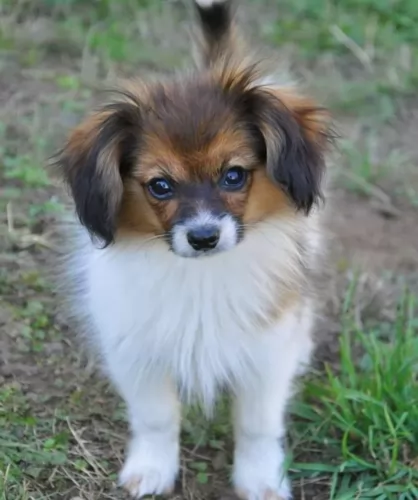 This toy breed stands at between 20 – 28cm in height and weighs around 4 – 5kg. He has floppy, silky ears and is a Papillon dog, and a Papillon with dropped ears is known as a Phalène.
This toy breed stands at between 20 – 28cm in height and weighs around 4 – 5kg. He has floppy, silky ears and is a Papillon dog, and a Papillon with dropped ears is known as a Phalène.
The dome of the head is rounded and the Phalene has a slim muzzle with bright, alert brown eyes and a black nose. The tail is well plumed and is carried over the back. The coat isn’t a double coat like many other dogs, but it is lustrous, being straight, long and smooth. The coat is available in a number of coat colors, essentially being a blend of white, tan, black and orange or fawn.
The Phalène is an intelligent dog, and they will be able to learn quickly and easily when you teach them how to sit, lie down or stay. Training and socialization is always excellent for dogs, even small ones like this as it teaches them to be obedient and well mannered.
The Phalene is a sociable, friendly dog but is inclined to be reserved around strangers. Phalènes are essentially lap dogs and they make great companions for all kinds of people as well as being great playmates for disciplined, kind children. Because he is small and calm, he makes a great pet for country- or city dwellers.
 They have a great sense of smell and a well-balanced personality.
They have a great sense of smell and a well-balanced personality.
They are not indoor dogs and should have a yard to run in. They do not tolerate hot weather well. They do great out in the country.
They are intelligent independent thinkers. They lengths well with positive reinforcement.
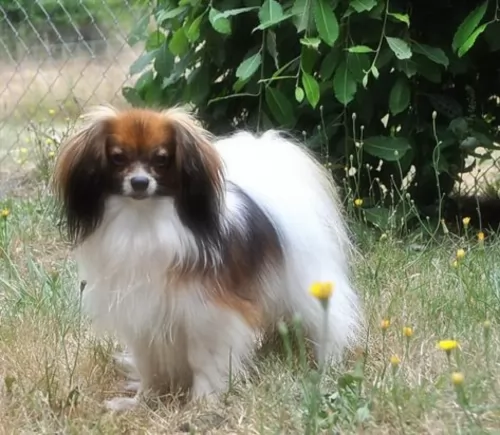 The Phalene is such a sweet little dog, and you can definitely count him as as ‘man’s best friend’. He just loves to be wherever his human family is, lapping up their attention indoors but also loving being with them outdoors. When well trained and socialized, these dogs make splendid playmates for children too.
The Phalene is such a sweet little dog, and you can definitely count him as as ‘man’s best friend’. He just loves to be wherever his human family is, lapping up their attention indoors but also loving being with them outdoors. When well trained and socialized, these dogs make splendid playmates for children too.
Small though he is, he makes a good watch dog too and he will bark to warn his human family of danger. Give him the love and care he so rightly deserves, and he promises to make you a splendid pet and companion.
 Though their isolation protected them from genetic health issues for centuries, once they were being rejuvenated and mixed with other breeds some common issues began to show up. These include:
Though their isolation protected them from genetic health issues for centuries, once they were being rejuvenated and mixed with other breeds some common issues began to show up. These include:
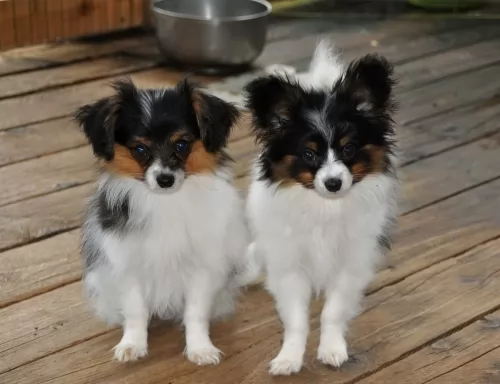 Your jaunty little Phalene can live to be up to 12 or 15 years of age if well cared for. Even so, there are always some of the more common dog illnesses worth knowing about, and we look at a few -
Your jaunty little Phalene can live to be up to 12 or 15 years of age if well cared for. Even so, there are always some of the more common dog illnesses worth knowing about, and we look at a few -
Any dog can get epilepsy – when your pet suddenly has a seizure or fit for no apparent reason. It can be disturbing to see, but with medication your pet can live a normal life.
Always keep a check on your pet’s eyes because there are a few eye diseases that can affect your pet and these are cataracts, progressive retina atrophy and entropion. Thankfully a veterinary ophthalmologist can help with the best treatment.
 Feed breed specific high quality dry food for puppies. Feed 1-2 cups in 3-4 meals per day
Feed breed specific high quality dry food for puppies. Feed 1-2 cups in 3-4 meals per day
Again Feed breed specific high quality dry food for adults. Feed 2-3 cups per day in 1-2 meals per day.
Points for Good Health – Stamina
The Hovawart needs plenty of exercise. Remember this is a mountain farm dog used to working all the time. Walk or jog with them daily. They can excel at field trials, obedience, search and rescue, agility, flyball, therapy dog, and service dog.
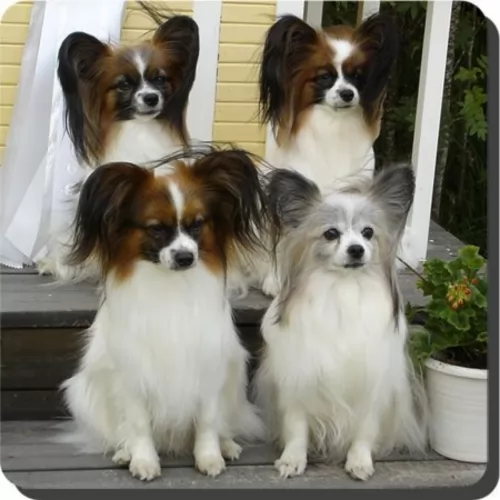 These are energetic little dogs and will require getting a regular dose of exercise. He loves a walk and being allowed off his leash for a good run. He also loves ball games. Exercise is important for small dogs like this to ward off obesity.
These are energetic little dogs and will require getting a regular dose of exercise. He loves a walk and being allowed off his leash for a good run. He also loves ball games. Exercise is important for small dogs like this to ward off obesity.
These little dogs will need to have their ears checked and cleaned if you want to avoid ear infections. If you’re not sure how to clean the inside of the ears, rather leave it to an expert who can show you how its done. Small dogs always need to have their teeth checked regularly. He will also need to have his nails trimmed.
To maintain the long, silky coat, brush your dog at least twice a week. Some Phalene dog owners take their pet to the vet to have the coat professionally groomed and trimmed.